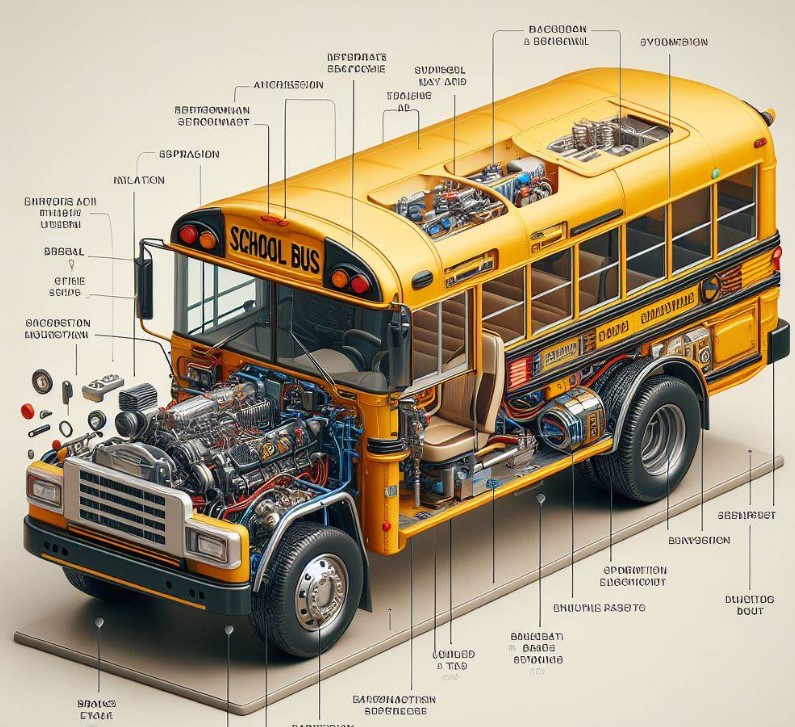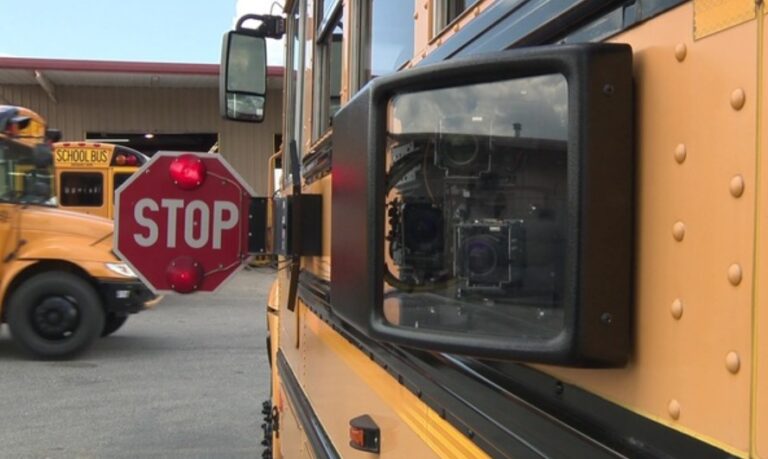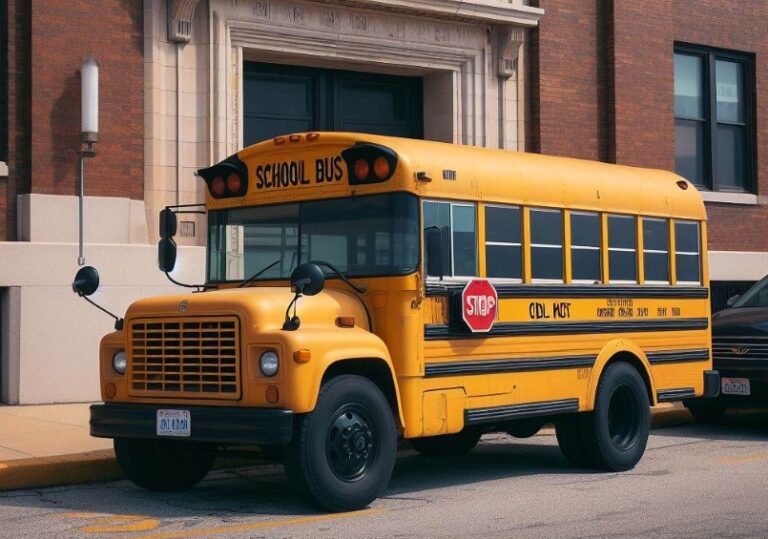What Kind Of Engines Do School Buses Have? Answered
When it comes to school buses, the engine is a critical component that dictates performance, efficiency, and environmental impact. The question, What Kind Of Engines Do School Buses Have? is not just about the mechanics but also about safety, economy, and environmental considerations. School buses are designed to be safe and reliable modes of transportation for millions of students daily. In this context, understanding the types of engines used in school buses is essential.
Key Takeaways
- Engine Types: Predominantly diesel, with increasing use of alternative fuels.
- Power and Efficiency: Designed for reliability and efficiency, not speed.
- Emission Standards: Modern engines adhere to strict emission standards.
- Fuel Economy: Influenced by engine type and bus design.
- Maintenance Requirements: Regular maintenance is critical for performance and safety.
What Kind Of Engines Do School Buses Have?
School buses primarily utilize diesel engines. These engines are known for their durability and efficiency, making them ideal for the heavy-duty requirements of school buses.
Diesel engines in school buses are designed to provide sufficient power while ensuring fuel efficiency and lower emissions. They are engineered to meet the demands of frequent stops and starts, typical in a school bus’s daily operation.

Diesel Engines: The Standard Choice
Diesel engines are the most common type in school buses for several reasons:
- Durability and Reliability: Diesel engines are built to last and withstand tough conditions.
- Fuel Efficiency: They offer better fuel economy compared to gasoline engines.
- Torque: High torque at low speeds is ideal for the stop-and-go nature of school bus routes.
Alternative Fuel Engines: A Rising Trend
There is a growing trend towards alternative fuel engines in school buses, including:
- Natural Gas: Offers cleaner emissions than diesel.
- Propane: Known for lower operating costs and clean-burning characteristics.
- Electric: Zero emissions and reduced maintenance needs, though currently less common due to higher upfront costs and infrastructure requirements.
Performance and Efficiency
The performance of school bus engines is not measured in speed but in reliability and efficiency. School buses require engines that can consistently perform under varying conditions while maintaining fuel efficiency.
Engine Power and Bus Capacity
The power of the engine is closely tied to the size and capacity of the bus. Larger buses require more powerful engines to accommodate more passengers and heavier loads.
Efficiency and Environmental Impact
Modern school bus engines are designed to be more fuel-efficient and environmentally friendly. This is partly due to stricter emission regulations and a growing emphasis on reducing the carbon footprint of school transportation.
Emission Standards and Regulations
Emission standards for school buses have become increasingly stringent over the years. These regulations aim to reduce the environmental impact of diesel and other fuel engines.
The Shift to Cleaner Engines
Recent advancements in engine technology have led to cleaner and more efficient school bus engines. These engines produce fewer emissions, contributing to better air quality, especially important in school environments.
Compliance with Federal and State Regulations
School buses must comply with federal and state emission standards. These standards ensure that buses contribute minimally to air pollution and adhere to environmental protection guidelines.
Fuel Economy and Operating Costs
The fuel economy of school buses is a significant factor in operating costs. Different engine types offer varying levels of fuel efficiency.

Diesel vs. Alternative Fuels
While diesel engines are known for their fuel efficiency, alternative fuel engines can offer comparable or even better fuel economy in some cases.
Impact of Bus Design
The design of the school bus, including aerodynamics and weight, also affects fuel economy. Newer models are designed to be more fuel-efficient, reducing operating costs.
Maintenance and Safety
Regular maintenance is crucial for the performance and safety of school bus engines.
Importance of Regular Maintenance
Regular maintenance ensures that school bus engines run efficiently and safely. This includes routine checks and timely repairs.
Safety Standards
Safety is paramount in school buses. Engine maintenance is a critical part of meeting safety standards and ensuring the well-being of passengers.
Are Diesel Engines Still Predominant in Modern School Buses?
Diesel engines have long been the standard in school bus transportation, primarily due to their reliability, durability, and efficiency. Historically, diesel engines are favored for their ability to provide high torque at low speeds, making them ideal for the stop-and-go nature of school routes.
They are built to withstand rigorous daily use and extended idle times, characteristics essential for the school transportation sector. Despite their benefits, diesel engines have faced increasing scrutiny due to environmental concerns, particularly regarding emissions.

In recent years, there’s been a noticeable shift towards more environmentally friendly alternatives. However, diesel remains prevalent due to its established infrastructure and the cost-effectiveness of maintaining existing fleets.
Advances in diesel technology, including improved emission control systems, have helped modern diesel engines remain competitive. These advancements align with stricter emission standards, ensuring that newer diesel engines are cleaner than their predecessors.
This ongoing evolution reflects the industry’s effort to balance environmental responsibilities with practical and economic considerations.
How Are Alternative Fuels Impacting School Bus Fleets?
The impact of alternative fuels on school bus fleets marks a significant shift in the industry. Fuels like natural gas, propane, and electricity are becoming more popular choices for new school buses.
Each of these alternatives offers unique advantages and challenges compared to traditional diesel engines. Natural gas buses, for example, emit fewer greenhouse gases and are often quieter than diesel buses, making them attractive for urban areas focused on reducing pollution and noise. Propane buses offer similar benefits, with the added advantage of generally lower fuel costs.
Electric buses represent the most significant shift, promising zero tailpipe emissions and reduced maintenance requirements. However, the higher upfront costs and the need for charging infrastructure have slowed their widespread adoption.
Despite these challenges, interest in electric school buses is growing, driven by environmental concerns and the potential for long-term cost savings. Grants and incentives are also playing a role in facilitating the transition to these cleaner alternatives.
As technology advances and costs decrease, alternative fuel buses will likely play an increasingly important role in school transportation, further reducing the sector’s environmental footprint.
What Are the Latest Advancements in School Bus Engine Technology?
Recent advancements in school bus engine technology are focused on increasing efficiency, reducing emissions, and improving reliability. Manufacturers are continually innovating to meet stricter emission standards and address environmental concerns.
One significant advancement is in the area of diesel engine technology, where newer engines feature advanced emission control systems. These systems, such as selective catalytic reduction (SCR) and diesel particulate filters (DPF), significantly reduce harmful emissions, making diesel buses much cleaner than in the past.

In the realm of alternative fuels, technological improvements are making these options more viable. For electric buses, advancements in battery technology are crucial. Increased battery capacity and efficiency mean longer ranges and shorter charging times, addressing two of the biggest challenges in electric bus adoption.
Similarly, for natural gas and propane buses, advancements in fuel storage and engine performance are making these options more practical and appealing.
These technological developments are not only making school buses cleaner and more efficient but are also ensuring that they continue to meet the safety and reliability standards essential for student transportation.
How Do School Bus Engines Affect Fuel Economy and Operating Costs?
The type of engine in a school bus significantly affects its fuel economy and, consequently, the operating costs for school districts. Diesel engines, traditionally known for their fuel efficiency, have been the go-to choice for many years.
However, the total cost of ownership for diesel buses includes factors like the cost of diesel fuel, maintenance, and adherence to emission standards, which can be significant.
The introduction of ultra-low sulfur diesel and biodiesel blends has also impacted the fuel economy and operating costs of diesel-powered buses.
On the other hand, alternative fuel engines, while potentially more expensive upfront, can offer lower operating costs over time. For instance, propane and natural gas tend to be cheaper than diesel on a per-gallon basis and often come with tax incentives or grants, making them economically attractive in the long run.
Electric buses have higher initial costs primarily due to their battery systems. However, they promise lower operating costs due to significantly reduced fuel and maintenance expenses. The total cost of ownership for electric buses can be lower when considering these long-term savings.
The fuel economy of electric buses also benefits from their efficiency in converting energy to power, leading to reduced energy costs per mile compared to traditional fuel buses.
Moreover, the impact of engine choice on operating costs extends beyond fuel expenses. Maintenance requirements differ significantly between diesel and alternative fuel engines.
Diesel engines, for instance, require complex after-treatment systems to meet emission standards, which can increase maintenance costs and downtime. In contrast, electric buses have fewer moving parts and do not require oil changes, leading to potentially lower maintenance costs.
Propane and natural gas buses also tend to have simpler maintenance requirements compared to diesel. As school districts weigh the options, the long-term operational and maintenance costs become a critical factor in determining the most economical and efficient choice for their transportation needs.
Conclusion
In conclusion, school buses primarily use diesel engines, with a growing interest in alternative fuels for environmental and economic reasons. These engines are designed for efficiency, safety, and compliance with stringent emission standards.
Understanding the intricacies of school bus engines is essential for appreciating the balance between performance, economy, and environmental stewardship.
The evolution of school bus engines reflects broader trends in automotive technology and environmental awareness. As we look to the future, the continued innovation in school bus engine design will play a pivotal role in shaping sustainable and efficient student transportation
Top FAQ’s
Are there any government incentives for school buses to use clean energy?
Yes, in many regions, there are government incentives and grants available for school buses using clean energy, like electric, natural gas, or propane. These incentives aim to offset the higher upfront costs and encourage the adoption of environmentally friendly vehicles. They often cover a portion of the purchase price or the cost of infrastructure development, such as installing charging stations for electric buses.
How do school districts decide between diesel and alternative fuel buses?
School districts consider factors like initial purchase cost, fuel and maintenance expenses, environmental impact, available infrastructure (such as charging stations for electric buses), and funding or grants for alternative fuel vehicles. The decision often involves a cost-benefit analysis of the vehicle’s expected lifespan.
What safety features are specific to propane school buses?
Propane school buses have several specific safety features, including leak detection systems, rugged fuel tanks designed to withstand impact, and shut-off valves to prevent propane release in the event of a collision. These features ensure that propane buses meet or exceed the safety standards of traditional diesel buses.
Can school buses use renewable natural gas (RNG), and what are the benefits?
Yes, school buses can use renewable natural gas (RNG), which is methane captured from organic waste sources. RNG buses benefit from reduced greenhouse gas emissions, lower fuel costs compared to diesel, and similar performance levels. RNG also contributes to the circular economy by utilizing waste products as a fuel source.

Welcome to the exhilarating world of Matt Rex, a professional car racer turned renowned vehicle enthusiast. Immerse yourself in his captivating blog as he shares heart-pounding adventures, expert reviews, and valuable insights on cars, trucks, jets, and more. Fuel your passion for speed and discover the beauty of vehicles through Matt’s engaging stories and meticulous expertise. Join the ever-growing community of enthusiasts who find inspiration and expert advice in Matt Rex’s blog—a digital hub where the thrill of speed meets the pursuit of knowledge.







